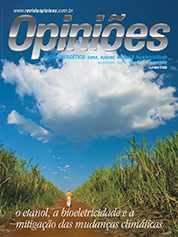Tasso Rezende de Azevedo
Forest and Climate Consultant
Op-AA-22
The Challenge of Developing Low Carbon
Brazil must create its own development model, aimed at building an educated, healthy, safe, ethical and happy society, capable of respecting past generations, while at the same time committing to future generations. This new model must be an evolution of recent conquests in terms of economic and social stability and tied to the urgent need of drastically reducing the intensity of greenhouse gas emissions, i.e., it must be linked to what has been termed a low carbon economy.
The challenge is to overcome a minimalist logic of growth indicators, to focus on an evolution of prosperity and sustainability. To develop in a sustainable manner may even mean to grow negatively. For example, to make use of public transportation or a bicycle, as alternatives to using a private car, contributes to a less polluted environment and fosters healthy physical practices.
However, this is based on a production chain of lower aggregate value and the migration from one model to another may imply growing negatively according to traditional concepts. The search for sustainable development in this 21st Century is intrinsically linked to the notion of decarbonizing the global economy. This process is necessary so that the planet’s emissions are reduced by at least 80% until 2050, and so that the average temperature on the planet will not increase by more than 2 °C, avoiding a series of negative impacts of gigantic magnitude.
This is a challenge for mankind and of fundamental importance for Brazil, since the country may be one of the most affected by global climate change, particularly as related to alterations in the hydric regime that endanger agriculture and the generation of electric power. The orientation afforded this new decarbonized economy will generate great opportunities.
The need to discover new technological solutions will challenge our scientists and is expected to foster a significant expansion of our R&D capacity. Most renewable energy alternatives are based on assets that are abundant in Brazil, as is the case of energy generated from the sun, the wind, from biomass and hydroelectric energy (from rivers and the tide).
Brazil has one of the largest insolation areas on the planet and one of the highest eolic potentials, both on land and at sea. Furthermore, we have the largest capacity to produce biomass on the entire planet, in addition to dominating biofuel technologies. Other areas too will be covered. Fossil fuel – the main emissions’ villain – is also the basis for the plastic, fertilizer and other chemical derivative industries.
Brazil already produces bio-degradable plastic, made directly from sugarcane biomass, and has made well-oriented investments in biotechnology, which, in the “bio-refineries”, can make feasible renewable alternatives for almost all products of the petrochemical industry. The path to this new development model must be laid out as soon as possible.
Decisions made today with respect to planning infrastructure, education and technology cannot be reverted in the short-term. A new thermoelectric plant, when contracted, in fact is a contract with a life of decades of greenhouse gas emissions. By the same token, an educational model implemented today will affect an entire generation, and there is no way back.
In the last 20 years, Brazil advanced significantly in terms of its formation as a nation, achieving economic stability and implementing an effective social inclusion policy. Now is the time to go beyond and place sustainability in the center of the country’s debating agenda. The electoral process of 2010 stands out as an excellent opportunity to reflect on this and to bring about the debate, and, who knows, regardless of who turns out to be the winner, make Brazil turn to focus on sustainable development.




